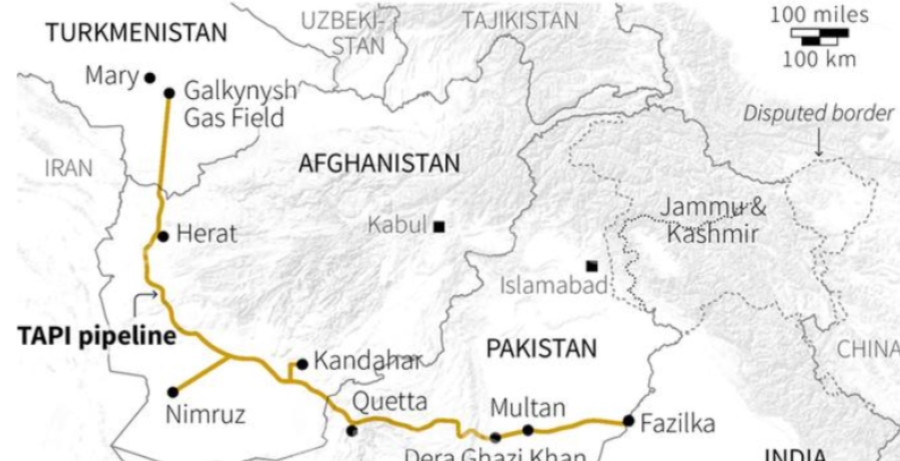Work On The TAPI Central Asia Pipeline Resumes Under the Taliban
By Pathik Hasan
The construction work of the Turkmenistan-Afghanistan-Pakistan-India gas pipeline is resuming on the Afghanistan section. It is a regional connectivity project for supplying gas from Turkmenistan to India’s Punjab to fulfill regional demand, and is a significant initiative proposed by the Asian Development Bank and currently involving four regional countries.
In part, it acts as a bridge between South Asia and Central Asia. We know Central Asia is a huge source of Natural gas. However TAPI has the potential to reach further. TAPI monetizes Turkmenistan’s gas reserves and supplies these to neighboring countries to promote the use of natural gas and improve energy security. Construction on the project in Turkmenistan began in December 2015, work on the Afghan section began in February 2018, and work on the Pakistani section was planned to commence in December 2018.
The pipeline is expected to carry 33 billion cubic meters of natural gas per year. The 1,814km pipeline stretches from Galkinesh, the world’s second-largest gas field, to the Indian city of Fazilka, near the Pakistan border.

Work on the TAPI project in Afghanistan began in February 2016. The 617 km pipeline of the gas pipeline was planned to pass through Afghanistan. But due to internal situation, security in Afghanistan and India-Pakistan tensions, regional issues the connectivity project wasn’t implemented.
There was speculation whether the connectivity project would be completed at all. The Taliban’s takeover of Kabul in August increased this speculation, but this has been clarified: work on Afghanistan’s part of the TAPI gas pipeline project is about to recommence. Afghanistan’s acting foreign minister, Amir Khan Muttaki, has said that work on Afghanistan’s part of the pipeline project from Turkmenistan to Afghanistan and Pakistan via India will resume, making these remarks following a meeting with Turkmen Foreign Minister Rashid Meredov in Kabul on October 31. The Turkmen foreign minister had arrived in Kabul on a two-day visit.
Other extensions are being discussed. Bangladesh applied to join the TAPI project in 2012, and could become the fifth nation after India to join the multi-billion-dollar project. Bangladesh can play an important role to strengthen regional energy cooperation, while the country also needs improved gas connectivity to accelerate its own development activities.
Currently, Bangladesh imports LNG from Qatar, and this is expensive. Bangladesh set its ‘Vision 2041’ to become a developed country by 2041. T d s, it needs more than expensive gas imports, and the TAPI gas project is seen as key by Dhaka.
Muttaki stated that Afghanistan and Turkmenistam sides discussed strengthening political and economic ties during the Turkmen foreign minister’s visit. “Important issues like TAPI, rail connectivity and electricity have been discussed. We have also talked about strengthening the projects that have already started.”
Other regional rivalries have also threatened to derail the project, not least between India and Pakistan. However, India’s Foreign Secretary has described the pipeline as a new chapter in cooperation between the four countries – including Delhi’s relations with Islamabad.
Pakistan will be the main customer of Turkmen gas via TAPI, with the country long suffering from energy shortages that affect families and businesses alike. As Pakistan seeks to industrialise, alongside China’s massive CPEC project, the supply of gas and electricity has become an integral part of the election manifestos of its political parties. TAPI is also expected to create 2,000 new employment opportunities in the country.
Afghanistan will also benefit. Despite US claims of ‘nation building’, very little infrastructure was invested into Afghanistan by the United States, whose true goal in Afghanistan was to secure Turkmen gas supplies for itself – a gambit that failed. There are enough Turkmen supplies to assist with Afghanistan’s own energy needs as it starts to rebuild and reconstruct, with the added bonus of an estimated US$1 billion per annum in transit fees and royalty payments.
TAPI also brings clean fuel to the growing economy of India, and help wean it off coal power in line with Cop26’s goals. TAPI’s uninterrupted gas flow will be extremely important for India’s energy sector.
Overall, now the immediate Afghan issue has been resolved, TAPI is expected to facilitate a unique level of trade and cooperation across the region, as well as support peace and security between the four countries. More than 1.5 billion people in Afghanistan, Pakistan and India are expected to benefit from the long-term energy security provided by the project, which will also increase Turkmenistan’s fiscal revenues. Pakistan will also benefit from transit fees.
Although Taliban’s takeover of Afghanistan has changed the geo-politics in the region, all impacted countries now appear to be work together for ensuring the mutual interest. All regional states, including India and Pakistan are working closely in the sector of trade and connectivity for ensuring the common greater interest. If TAPI were to be extended to Bangladesh, Nepal, Bhutan, all regional actors would benefit from this energy connectivity, and help stabilize and create wealth across a much-maligned area of Asia.
We are grateful to Pathik Hasan for his assistance with this article. Dr. Hasan is a Dhaka based NGO worker and freelance writer commenting on current affairs and international politics. He can be contacted at pathikhasan1141@gmail.com
Related Reading
About Us
Silk Road Briefing is written by Dezan Shira & Associates. The firm has 28 offices throughout Asia, and assists foreign investors into the region. For strategic advisory and business intelligence issues please contact the firm at silkroad@dezshira.com or visit www.dezshira.com





